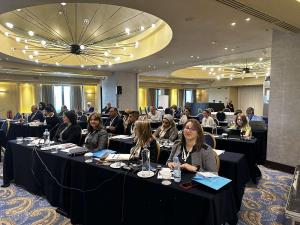The Mediterranean Region, home to over 510 million people, is an important crossroads for economic, social and cultural exchanges between Europe, Africa, Asia and other continents. The region is rich in biodiversity, but has come under pressure due to the intensive exploitation of mineral resources and mass tourism linked to its numerous cultural landmarks. The region is also warming 20 per cent faster than the global average, placing additional pressure on already fragile ecosystems and vulnerable economies and societies. Coastal zones affected by flooding and erosion, and the salinization of river deltas and aquifers alter food security and livelihoods. The region has been also affected by political instability, armed conflict and rising unemployment.
Participatory decision-making and good governance play a key role in addressing environmental challenges in the region, which, in turn, have direct relevance for the implementation of the 2030 Agenda for Sustainable Development, including Sustainable Development Goal 16 (Peace, justice and strong institutions). Member States in this region are bound by different international obligations, and some are Parties to the Convention for the Protection of the Marine Environment and the Coastal Region of the Mediterranean (Barcelona Convention), but not to the Convention on Access to Information, Public Participation in Decision-making and Access to Justice in Environmental Matters (Aarhus Convention). Currently, 11 States of the Mediterranean region, as well as the European Union, are Parties to both the Aarhus Convention and the Barcelona Convention. However, countries of the Mediterranean region decided to further accession to the Aarhus Convention through the Mediterranean Strategy for Sustainable Development 2016–2025. The aim in this regard is to ensure that, by 2025, two thirds of Mediterranean countries will have acceded to the Aarhus Convention.
To assist member States in achieving this goal, a dedicated training session to promote the Aarhus Convention in the region was held in Athens on 14–15 November 2023. The event gathered officials from ministries of environment, water, foreign affairs and justice from a number of countries, including Bosnia and Herzegovina, Cyprus, Egypt, Greece, Jordan, Lebanon, Malta, Montenegro, Morocco and Tunisia, as well as representatives of intergovernmental and non-governmental organizations. Several participants also followed the meeting online.
The main purpose of the training session was to strengthen the expert capacity of representatives of public authorities with regard to access to information, public participation in decision-making in national and international contexts, and access to justice in environmental matters. Participants also learnt about the benefits of accession to the Convention and the related procedures. Parties to the Aarhus Convention, namely, Bosnia and Herzegovina, Cyprus, Malta and Montenegro, shared examples of the practical implementation of the Convention’s provisions.
The event was co-organized by the European Union-funded “Water and Environment Support (WES) in the ENI Neighbourhood South Region” project and the UNECE Aarhus Convention secretariat. The secretariat also cooperated closely with its sister organization, the Barcelona Convention secretariat, to promote accession.
The Aarhus Convention was adopted on 25 June 1998, at the Fourth Ministerial “Environment for Europe” Conference (Aarhus, Denmark). Together with its Protocol on Pollutant Release and Transfer Registers, the Convention protects the right of every person to live in an environment adequate to his or her health and well-being. The Convention and its Protocol are the only legally binding instruments open for accession to all States Members of the United Nations that provide solid legal frameworks to support the achievement of Sustainable Development Goals through transparent and participatory processes.
